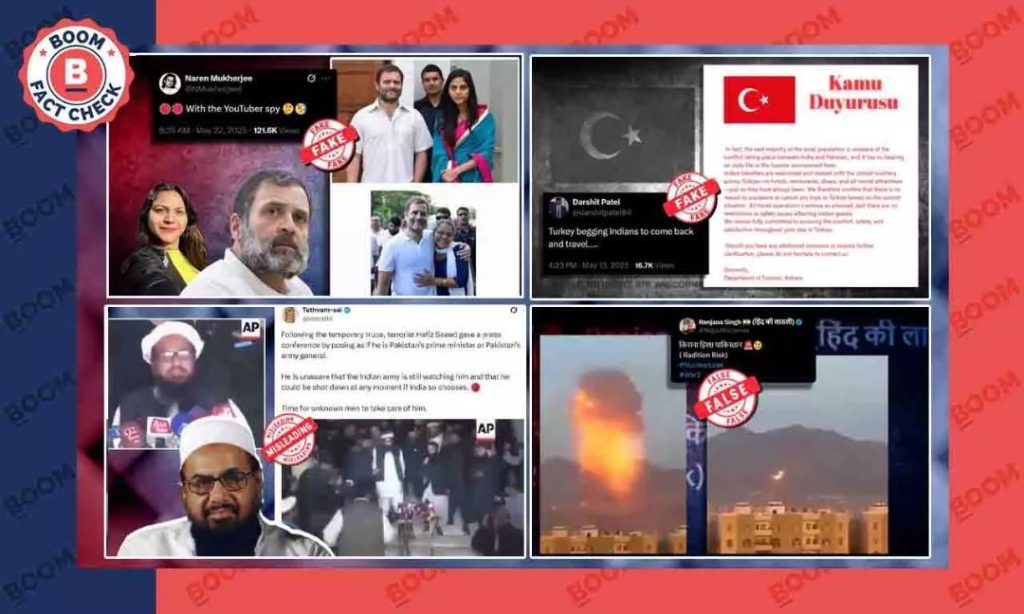
Fact Check Friday: Top 5 Viral Fake News Debunked
In today’s digital age, misinformation spreads like wildfire, often before we can even verify its authenticity. From fake news stories to manipulated images and videos, it can be overwhelming to keep track of what’s true and what’s not. That’s where we come in – BOOM’s Fact Check Friday is here to bring clarity amidst the chaos.
This week, we’re busting five viral claims that made headlines, from a Yemen explosion mislabeled as India’s strike in Pakistan to AI-altered images of prominent politicians. A fake Turkish tourism notice and a 2017 video of Hafiz Saeed also made the rounds, spreading misinformation and confusion.
Claim 1: Yemen Explosion is India’s Strike in Pakistan
On Monday, a massive explosion rocked Yemen’s rebel-held capital, Sanaa. However, social media was flooded with claims that this was India’s retaliatory strike against Pakistan, following the Pulwama terror attack. But, fact-checking by BOOM revealed that the explosion was, in fact, a result of a missile attack by the Saudi-led coalition on a rebel-held facility in Yemen.
India’s Ministry of External Affairs also issued a statement denying any involvement in the attack. The Ministry stated that India is committed to maintaining peace and stability in the region and is working towards a peaceful resolution of the Kashmir conflict.
Claim 2: AI-Generated Images of Rahul Gandhi and Jyoti Malhotra
A series of images went viral on social media, showing Congress leader Rahul Gandhi and journalist Jyoti Malhotra with digitally altered faces. The images were created using AI technology and were shared with the intention of spreading misinformation. However, fact-checking by BOOM revealed that the images were fabricated and not authentic.
Rahul Gandhi’s office also issued a statement denying the authenticity of the images. In a tweet, the Congress leader’s office stated, “The morphed images of Rahul Gandhi and Jyoti Malhotra are fake and have been created to spread misinformation. We urge everyone to verify information before sharing it on social media.”
Claim 3: Fake Turkish Tourism Notice
A notice claiming that Turkey was banning tourists from visiting Pakistan due to security concerns went viral on social media. However, fact-checking by BOOM revealed that the notice was completely fabricated and not issued by the Turkish government.
The Turkish Embassy in Pakistan also issued a statement denying the authenticity of the notice. In a tweet, the Embassy stated, “This notice is completely false and has no basis in reality. We encourage all tourists to continue visiting Pakistan, which is a safe and welcoming country.”
Claim 4: 2017 Video of Hafiz Saeed
A video allegedly showing Hafiz Saeed, the founder of Lashkar-e-Taiba, was shared on social media with the claim that it was recorded in 2020. However, fact-checking by BOOM revealed that the video was actually recorded in 2017.
The video was originally shared on YouTube in 2017 and was taken down due to copyright issues. It was then shared again on social media with the misleading claim that it was a recent recording.
Claim 5: Video of Indian Soldiers in Pakistan
A video allegedly showing Indian soldiers in Pakistan, claiming to have infiltrated across the border, went viral on social media. However, fact-checking by BOOM revealed that the video was actually recorded in 2019 and was part of a military exercise.
The Indian Army also issued a statement denying the authenticity of the video. In a tweet, the Army stated, “The video being circulated on social media is old and is part of an exercise conducted by the Indian Army in 2019. It is not related to any incursion or infiltration across the border.”
Conclusion
In today’s digitally driven world, it’s essential to be cautious of misinformation and verify facts before sharing them on social media. BOOM’s Fact Check Friday is here to help you stay informed and avoid spreading fake news.
Remember, always fact-check before sharing, and be wary of sensational headlines and unverified claims. By being informed and responsible, we can create a safer and more informed online community.
Source:






